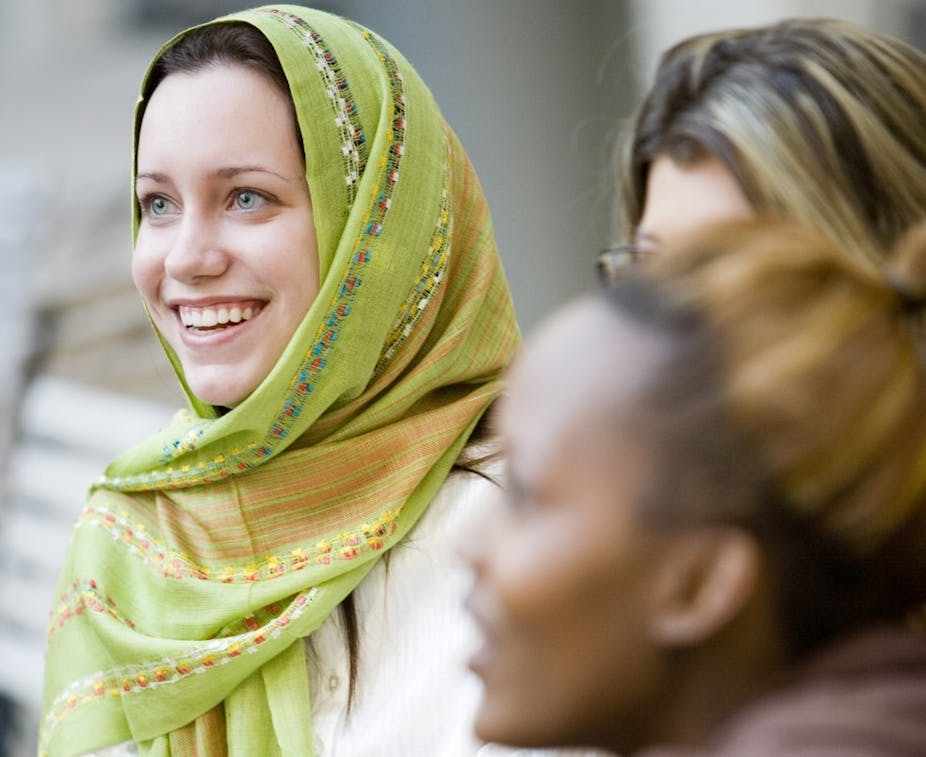Converting to Islam in the UK as a woman is “not for the faint-hearted” according to a report released yesterday by the University of Cambridge which finds converts are stigmatised by the wider community, stereotyped by the media and often shunned by their family and non-Muslim friends.
“Narratives of Conversion to Islam in Britain: Female Perspectives” was produced by the university’s Centre of Islamic Studies (CIS), in association with the New Muslims Project of Markfield in London. The conclusions are based on a series of forums and examines the experiences of nearly 50 British women who have converted to Islam.
Discussions focus on the challenges of adapting to the practices of a new faith, the effect on the converts’ family and friends, the complexity of the relationship between female converts and the heritage Muslim community and the lack of support and facilities to those women converts who live outside traditional family networks.
The project’s director, Yasir Suleiman, professor of modern Arabic studies at the University of Cambridge, said the report had been compiled from the experiences and opinions of about 50 women living in the UK who had converted to Islam. Discussions had taken the form of forums held over several weekends.
“The important thing about the report is the huge diversity among the convert community, which reflects the huge diversity to be found among the heritage Muslim community in Britain,” Professor Suleiman said.
“The consistent theme flowing through the report is the need for increased levels of support for the convert community – and the convert’s own potential to be a powerful and transformative influence on both the heritage Muslim community and wider British society.
Islam has a negative media image
"Another of the recurring themes was the overwhelmingly negative portrayal of Muslims and Islam in the UK media and what role the convert community might have to play in helping redress the balance.”
The report addresses some of the challenges of converting to Islam in modern British society, something Professor Suleiman says is “not an easy journey – it is very demanding. It’s not about just donning a hijab and suddenly you are a Muslim. It’s not for the faint-hearted. It’s about discipline, learning, growing spiritually”.
The women talked of a range of different reactions from their families and friends to their decision to convert, from exclusion and disbelief to acceptance and understanding. This was largely mirrored by the complexity of the relationships between converts and the heritage Muslim community they were converting to join.
Some women reported losing their jobs and estrangement from their social networks over their decision to convert to Islam.
Thorny question of womens’ rights and Islam
For many women in the UK, the decision to convert meant confronting complex women’s rights issues. The report found that while converts were not unanimously supportive of feminism as defined in Western culture most felt there was a need to raise the status of women within Islam. Sharia courts operating in Britain came in for criticism as a “Mickey Mouse courts based on 7th century interpretations of Islam”.
Feelings towards adopting Islamic forms of dress, including the hijab, differed widely. Most felt it was the most obvious and visible change and the one that elicited the strongest reaction – often negative – from non-Muslim society.
One participant said she felt she was making “a strong stand to wear a hijab, to declare who I was to other people,” whereas other participants who chose not to wear the head covering either because they simply did not view it as a necessary accompaniment to their faith or because they were worried about facing negative reaction.
“This wonderful thing of hijab is becoming a poisoned chalice. Is the hijab wearing you or are you wearing the hijab?” one participant asked.
Professor Suleiman said: “Not all women wear the hijab consistently – some wear it sometimes and not at others. It is largely dictated by the person’s individual journey modulated by geography. In a big city like London you can wear the hijab and it is invisible. In a small town in the Midlands, on the other hand, it is far more noticeable. Locality plays an important part in the experience of the convert.”
Many women said they felt they had been forced to adopt more conservative attitudes than those they had grown up with. There were tensions between the converts and heritage Muslim society over faith, gender sexuality and politics.
Professor Suleiman said: “We did not shy away from talking about sexuality or other difficult issues which may be used as sticks by ill-intentioned people to beat the Muslim community with.”
The report recommends setting up social and educational opportunities within Islam for converts and heritage Muslims to exchange ideas and views, and social and cultural opportunities for converts to provide a bridge between heritage Islam and the wider community.
Other recommendations include providing services for converts who marry into Islam, including pre- and post-nuptial counselling and support and legal advice.

